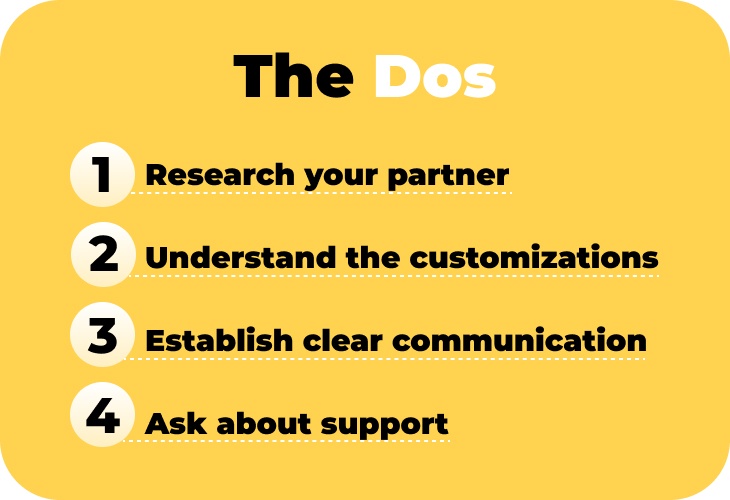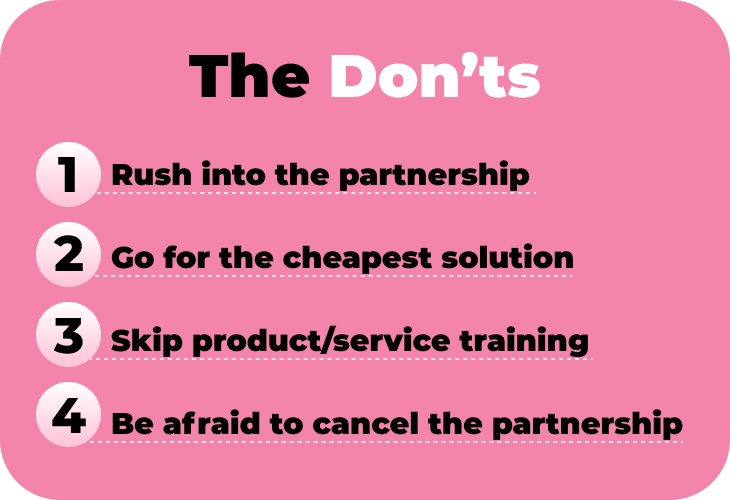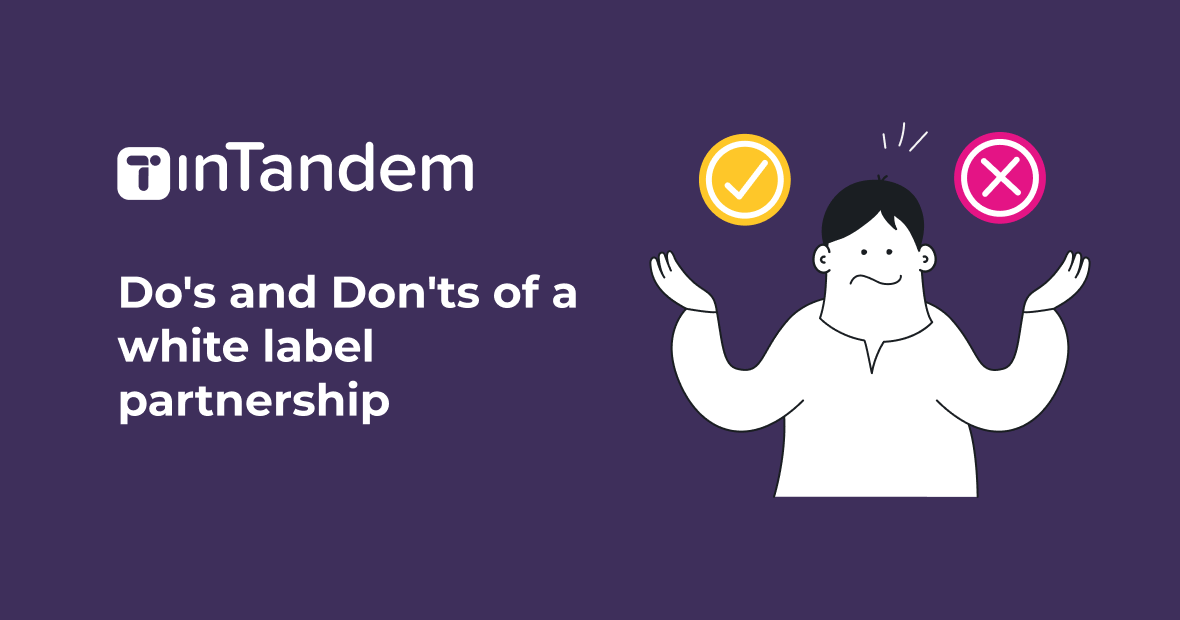White label partnerships have become a popular business strategy, enabling companies to offer new services or products without having to invest in the time, effort, and resources required to develop them from scratch.
However, cultivating these partnerships takes time and effort on behalf of the business looking to reap the benefits of a white label solution.
Like any business strategy, there are certain dos and don’ts that need to be kept in mind when entering into such a partnership. In this blog post, we will explore some of the most important dos and don’ts in order to help you maximize the success of your white label partnership.

Do: Research your partner
Choosing the right partner is one of the most critical factors when entering into a white label partnership. Before you sign any contracts or agreements, do your research to ensure that the partner you are working with has a good reputation, a solid track record, and the ability to deliver what they promise. Hop on a few calls with the company’s partner team and ask them any and all questions you may have. Remember that your partnership with them will be for the long term, so it all starts with research.
Do: Understand the customizations available
Part of the benefits of partnering with a white label solution is that you can customize the solution to be directly tailored to your business needs. From the colors used, to the different moving parts of the solution, you should be able to pick and choose the way the final outcome will look and feel. Get to know all the features and customizations available with the white label partner and create a solution that your clients will absolutely love.
Do: Establish clear communication
Clear communication is key to any successful business partnership. Ensure that all parties involved understand their roles and responsibilities, the timeline for delivery, and the expectations for communication throughout the process. In addition, transparency is a must, especially when it comes to roadmaps and release schedules.
Establish a frequency of communication (we find once a month to be a sweet spot) and outline what will be discussed at these meetings. Be sure to discuss results and concerns, as well as find solutions to burning issues.
Do: Ask about support
This one is a big one. In order to achieve success, you’ll need a lot of help from your white label partner. You should not be expected to learn and do everything from scratch. When entering a white label partnership, you need to understand the level of support they provide. Will they just hand you a product and throw you into the deep end? Or will they provide you with marketing and sales enablement kits, training, and even CSaaS (customer support as a service)? Will they be in contact with your clients directly? If so, what will that look like?
Assess how the white label company responds to feedback, sales and ongoing support, and necessary product changes. You’ll want them to be as professional as possible, especially since they’ll likely be doing it on your company’s behalf.

Don’t: Rush into the partnership
While a white label partnership can be an excellent opportunity to expand your business offerings, it is important not to rush into it. Take the time to assess whether the partnership is the right fit for your business, consider the risks and benefits, and negotiate the terms that work best for both parties. Ask yourself all the right questions before you enter the partnership:
- Does their product answer the needs of my customers?
- Will it be easy to integrate?
- Do they have the experience and knowledge necessary to ensure my success?
- Will my company’s goals and objectives be at the forefront of the agreement?
Don’t: Just go for the cheapest solution
Pricing is important, and will likely make it onto your list of top priorities for a white label partnership, but it’s definitely not all you need to look at. Chances are, if you’re going for the cheapest solution, something else is lacking somewhere. It may be support, it may be features and capabilities, or it may come in the form of how the partner handles the partnership. All of these are red flags, and you should stay away from entering a partnership with a company that is frugal in any of those areas being that it won’t help you achieve your end goals.
Don’t: Skip product/service training
Your white label partner should offer you sales and marketing training. Take it and offer it to everyone and anyone that might need it. It takes a lot to understand a white label solution, so without the training, your team will likely struggle and success will (to say the least) start on a bumpy road. Each white label solution has its own nuances and benefits, so you need to get the big picture and gain the “insider scoop” on what to expect. That can only come with the expertise of the white label company’s training sessions. Skipping out on them would be a grave mistake that could even cause the partnership to fail.
Don’t: Be afraid to cancel the partnership
Sometimes it just doesn’t work out and that’s okay, but knowing when to call it quits is crucial. As white label solutions often don’t come with any overhead costs, you may think ‘I’m not losing any money here, so what’s the harm?’ Big mistake. A white label solution that isn’t helping your company achieve the goals that were set in the beginning is likely harming your reputation and causing clients to leave. That directly translates to dollars down the drain and possibly even longer term implications. If you’re questioning the effectiveness of the partnership and seeing bad or no results after a few months, call it quits and move on.
White label partnerships approached with caution and care
A white label partnership can be an effective way to grow your business, but it is essential to approach it with caution and care. By following the dos and don’ts outlined above, you can help ensure that it is a successful and profitable venture for both parties involved.
White label partnerships help businesses expand their offering, increase revenue streams, strengthen relationships with their clients, and gain a competitive edge. However, that is only true when done the right way.
vcita partners with leading organizations that serve SMBs to propel forward a joint vision of empowering SMB digital transformation. To learn more, check out vcita’s partnership program.


























